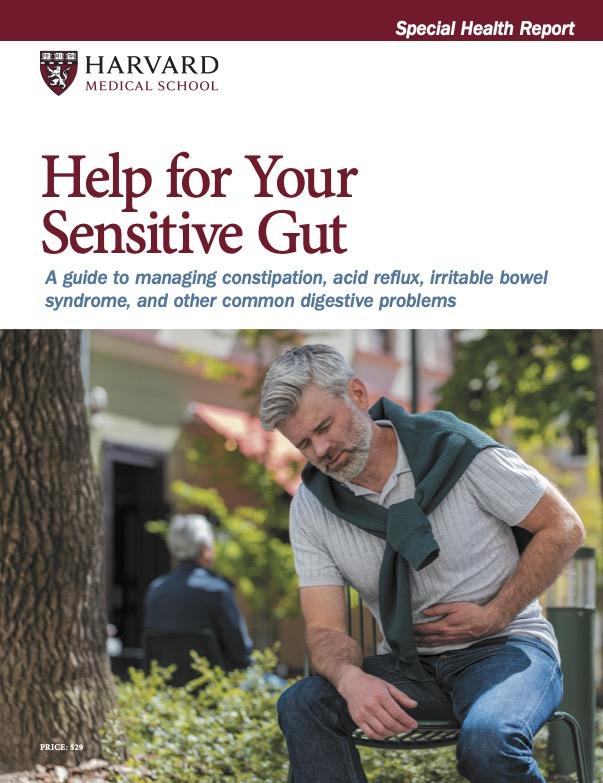Letting the air out of bloating
Why does bloating seem to happen more often with age?
- Reviewed by Howard E. LeWine, MD, Chief Medical Editor, Harvard Health Publishing; Editorial Advisory Board Member, Harvard Health Publishing

If you’ve noticed feeling more bloated than usual after eating, it’s not your imagination. Like many body functions, the digestion process slows as you age, causing digested food to take its time moving along the gastrointestinal tract from the stomach through the intestines. “The longer food stays in the digestive tract, the more opportunity there is for gas to be produced and build up, resulting in bloating,” says Dr. Kyle Staller, a gastroenterologist at Harvard-affiliated Massachusetts General Hospital.
The shape of gas
Your belly can reshape and expand to handle small amounts of gas produced during regular digestion. With normal gas production, the diaphragm (the sheet of muscle that divides the chest from the abdomen) rises and the abdominal wall tightens to allow the belly to maintain its shape. However, too much gas can overwhelm the space, causing the abdomen to protrude.
What most people refer to as “bloating” is technically two different actions. Bloating is the sensation of abdominal pressure, while distension is the physical swelling of the belly. Together, they cause tightness, fullness, and pressure, with the discomfort ranging from mild to intense.
Occasional bloating is usually nothing to worry about. The body is good at removing excess gas, either up and out with a belch or down and out as flatulence. Taking an over-the-counter anti-gas remedy like Gas-X may help ease more severe bouts. The active ingredient, simethicone, breaks up gas bubbles. “There is not much science behind their effectiveness, but they can help some people, and it usually doesn’t hurt to try them,” says Dr. Staller.
Bloating from sensitive nervesAnother possible cause of bloating is when the body has an abnormal reaction to normal gas in the body. “We all accumulate some amount of gas over the course of the day, even when not eating,” says Dr. Kyle Staller, a gastroenterologist with Massachusetts General Hospital. “Normally, our diaphragm rises and our abdominal wall tightens as a normal reflex, preserving the shape of our belly. However, in some cases, this reflex malfunctions and the opposite happens — the diaphragm flattens while the abdominal wall relaxes. The result is that a normal amount of gas can cause the abdomen to swell.” This abnormal reflex is more common in people with sensitive nervous systems, especially those who struggle with irritable bowel syndrome. “Biofeedback techniques are emerging to help retrain this abnormal reflex,” says Dr. Staller. “In the meantime, the best approach is to manage bloating through modifying diet, treating constipation, and avoiding taking in excess air.” |
Watch what you eat
If you suffer from recurring bloating, it’s usually caused by food. But it’s not necessarily what you eat that’s the problem: it’s how your body reacts. For instance, many people have difficulty digesting sugars in certain categories, collectively called FODMAPs (fermentable oligosaccharides, disaccharides, monosaccharides, and polyols).
Examples of high-FODMAP foods include wheat, rye, onions, garlic, legumes (chickpeas, lentils, beans), honey, pistachios, cashews, some fruits, asparagus, and artichokes. Foods or drinks with fructose or artificial sweeteners also contain FODMAPs.
“These sugars are not easily digested, which causes increased fermentation by gut bacteria and creates more gas,” says Dr. Staller. Some people react to them more severely than others, he adds. “There’s not much evidence that we tolerate FODMAPs less as we age.” Another FODMAP people have a hard time digesting is lactose found in dairy products. “People who are considered lactose intolerant don’t produce enough lactase, the enzyme that breaks down lactose,” says Dr. Staller.
Consuming high-fat foods also can lead to bloating, as fat tends to slow gastric emptying. Excessive bloating could be caused by chronic constipation, defined by having fewer than three bowel movements per week, having hard or dry stools, needing to strain to move the bowels, and having a sense of an incomplete emptying. “Taking fiber supplements or an occasional laxative can help treat constipation,” says Dr. Staller.
When bloating is more than annoyingIf bloating becomes more frequent or challenging to manage, it could be a symptom of an underlying digestive condition. For example: Irritable bowel syndrome. This common disorder frequently involves symptoms besides bloating, such as cramping, abdominal pain, and irregular bowel movements. Inflammatory bowel disease (IBD). IBD includes ulcerative colitis and Crohn’s disease, both of which are caused by inflammation of the lining of the gastrointestinal tract. Celiac disease. This is an autoimmune disease in which the immune system attacks the small intestine. Attacks are triggered by a protein called gluten, found in wheat, barley, and rye. In rare cases, bloating could be a symptom of cancer of the colon, stomach, or pancreas. “You should see your doctor if bloating becomes severe or if it’s accompanied by other issues like bloody or black stools, unintentional weight loss, or persistent diarrhea,” says Dr. Kyle Staller, a gastroenterologist with Massachusetts General Hospital. |
Deflating bloating
Since most bouts of recurring bloating are linked to diet, Dr. Staller recommends focusing on finding problem foods. “Begin by cutting out dairy products, as many people with a bloating problem are likely to have some kind of intolerance to lactose,” he says. If that doesn’t help, reduce or eliminate FODMAP foods you regularly eat.
“Unless you are fairly certain which foods are the culprit, it’s best to consult a dietitian,” says Dr. Staller. A dietitian can help identify the problem food(s) through an elimination diet, in which FODMAP foods are eliminated one by one and then reintroduced to see if they cause bloating.
Once the problem foods are found, a dietitian can help adjust your diet so you can avoid those foods without neglecting vital nutrients.
Other ways to help reduce bloating are cutting back on carbonated beverages and being mindful of your eating habits. “When you eat too fast or too much, or if you talk a lot while eating, you can swallow excess air, which can trigger bloating,” says Dr. Staller. “Eating slower and consuming smaller meals can help cut down on taking in too much air.”
This article is brought to you by Harvard Health Online+, the trusted subscription service from Harvard Medical School. Subscribers enjoy unlimited access to our entire website, including exclusive content, tools, and features available only to members. If you're already a subscriber, you can access your library here.
Image: © champpixs/Getty Images
About the Author

Matthew Solan, Former Executive Editor, Harvard Men's Health Watch
About the Reviewer

Howard E. LeWine, MD, Chief Medical Editor, Harvard Health Publishing; Editorial Advisory Board Member, Harvard Health Publishing
Disclaimer:
As a service to our readers, Harvard Health Publishing provides access to our library of archived content. Please note the date of last review or update on all articles.
No content on this site, regardless of date, should ever be used as a substitute for direct medical advice from your doctor or other qualified clinician.
















